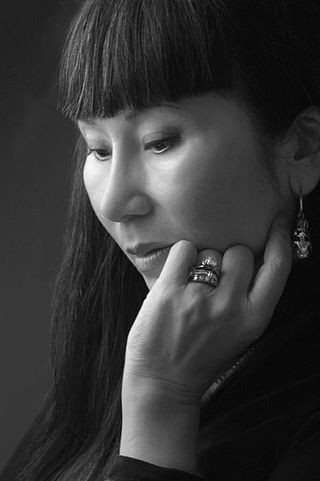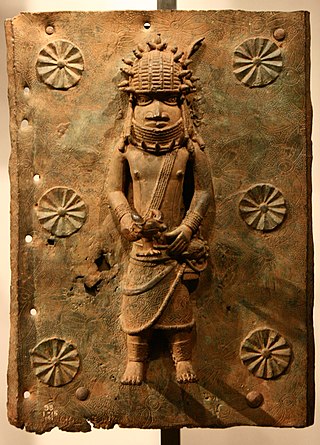
Amy Ruth Tan is an American author known for the novel The Joy Luck Club, which was adapted into a film of the same name, as well as other novels, short story collections, and children's books.

Florence Onyebuchi "Buchi" Emecheta was a Nigerian-born novelist, based in the UK from 1962, who also wrote plays and an autobiography, as well as works for children. She was the author of more than 20 books, including Second Class Citizen (1974), The Bride Price (1976), The Slave Girl (1977) and The Joys of Motherhood (1979). Most of her early novels were published by Allison and Busby, where her editor was Margaret Busby.

The Benin Bronzes are a group of several thousand metal plaques and sculptures that decorated the royal palace of the Kingdom of Benin, in what is now Edo State, Nigeria. Collectively, the objects form the best examples of Benin art and were created from the thirteenth century by artists of the Edo people. Apart from the plaques, other sculptures in brass or bronze include portrait heads, jewelry, and smaller pieces.

The Caine Prize for African Writing is an annual literary award for the best original short story by an African writer, whether in Africa or elsewhere, published in the English language. Founded in the United Kingdom in 2000, the £10,000 prize was named in memory of businessman and philanthropist Sir Michael Harris Caine, former Chairman of Booker Group plc and of the Booker Prize management committee. Because of this connection with the Booker Prize, the Caine Prize is sometimes called the "African Booker". The prize is known as the AKO Caine Prize for African Writing. The Chair of the Board is Ellah Wakatama, appointed in 2019.

The Esan people (Esan: are an ethnic group of southern Nigeria who speak the Esan language. The Esan are traditionally known to be agriculturalists, trado-medical practitioners, mercenary warriors and hunters. They cultivate palm trees, Irvingia gabonensis, Cherry, bell pepper coconut, betel nut, kola nut, black pear, avocado pear, yams, cocoyam, cassava, maize, rice, beans, groundnut, bananas, oranges, plantains, sugar cane, tomato, potato, okra, pineapple, paw paw, and various vegetables.

Most African sculpture was historically in wood and other organic materials that have not survived from earlier than at most a few centuries ago; older pottery figures are found from a number of areas. Masks are important elements in the art of many peoples, along with human figures, often highly stylized. There is a vast variety of styles, often varying within the same context of origin depending on the use of the object, but wide regional trends are apparent; sculpture is most common among "groups of settled cultivators in the areas drained by the Niger and Congo rivers" in West Africa. Direct images of African deities are relatively infrequent, but masks in particular are or were often made for traditional African religious ceremonies; today many are made for tourists as "airport art". African masks were an influence on European Modernist art, which was inspired by their lack of concern for naturalistic depiction.

Oba Esigie was the son of Oba Ozolua, who reigned in about 1481, and his second wife, Queen Idia. Oba Esigie ruled the ancient Benin Kingdom, now Benin City, Edo State, Nigeria. Works of art commissioned by Esigie are held in prominent museums including the Metropolitan Museum of Art and the British Museum.

Idia was the mother of Esigie, who reigned as Oba (king) of the Edo people from 1504 to 1550. Historians do know that Idia was alive during the Idah war because she played a role that led to a great Benin victory. It has been argued that Idia, therefore, was the true power behind the throne of her son. She played a significant role in the rise and reign of her son, being described as a great warrior who fought relentlessly before and during her son's reign as the Oba (king) of the Edo people. Queen Idia was instrumental in securing the title of Oba for her son Esigie following the death of his father Oba Ozolua. To that end, she raised an army to fight off his brother Arhuaran who was supposed to be the Oba by right and tradition but was subsequently defeated in battle. Esigie’s mother became the 17th Oba of Benin.

Ogbidi Okojie, Onojie (king) of Uromi, was a ruler of the Esan people in what is now Edo State in Nigeria, still remembered for his opposition to British rule.

Benin art is the art from the Kingdom of Benin or Edo Empire (1440–1897), a pre-colonial African state located in what is now known as the Southern region of Nigeria. Primarily made of cast bronze and carved ivory, Benin art was produced mainly for the court of the Oba of Benin – a divine ruler for whom the craftsmen produced a range of ceremonially significant objects. The full complexity of these works can be appreciated through the awareness and consideration of two complementary cultural perceptions of the art of Benin: the Western appreciation of them primarily as works of art, and their understanding in Benin as historical documents and as mnemonic devices to reconstruct history, or as ritual objects. This original significance is of great importance in Benin.

Uromi is a city located in north-eastern Esan, a sub-ethnic group of the Benin in Edo state, Nigeria. At various points in Uromi's history, the city and people have been an important part of the Benin Empire.

Ewu is a Nigerian town situated in Esan Central Local Government Area in the Edo State of Nigeria. The city, an Esan tribe, lies on 200 feet in the plateau region of central Edo State, 100 kilometres north of Benin City, the capital of Edo State, Nigeria.

The Bronze Head from Ife, or Ife Head, is one of eighteen copper alloy sculptures that were unearthed in 1938 at Ife in Nigeria, the religious and former royal centre of the Yoruba people. It is believed to represent a king. It was probably made in the fourteenth-fifteenth century C.E. The realism and sophisticated craftsmanship of the objects challenged the offensive and patronising Western conceptions of African art. The naturalistic features of the Ife heads are unique and the stylistic similarities of these works "suggest that they were made by an individual artist or in a single workshop."

Esanland, is a cultural region located in Edo State, Nigeria. It is composed of five Local Government Areas in Edo State. Esanland lies west of the banks of the Niger River. It is bordered by Kogi State, Delta State, Edo South Senatorial District, and Edo North Senatorial District. Esanland covers about 2,800 square kilometers and is home to over half a million people. The Esan people and culture of Esanland are generally homogenous.

Peju Layiwola is an art Historian and visual artist from Nigeria who works in a variety of media and genre. She is listed as a "21st Century Avant-Garde" in the book Art Cities of the Future published by Phaidon Press She is currently a Professor of Art and Art history at the University of Lagos and has been described as a "multitalented artist." Her works can be found in the collection of Microsoft Lagos, Yemisi Shyllon Museum, Pan Atlantic, Lagos and homes of private collectors such as JP and Ebun Clark and the Obi of Onitsha.

Ini Dima-Okojie is a Nigerian actress from Edo State, Nigeria. She resigned from her job in investment banking to enroll at the New York Film Academy. She started her career with the first television appearance on Taste of Love and she has featured on many films including the multicultural romcom, Namaste Wahala in 2021 and the Netflix Nigerian original thriller, Blood Sisters in 2022.
Jacaranda Books is a diversity-led British independent book publishing firm launched in 2012 and known for their effort tackling the gap between white authors and the BAME demographic in United Kingdom's publishing industry.

Irenosen Iseghohi Okojie FRSL is a Nigerian-born short story and novel writer working in London. Her stories incorporate speculative elements and also make use of her West African heritage. Her first novel, Butterfly Fish won a Betty Trask Award in 2016, and her story "Grace Jones" won the 2020 Caine Prize for African Writing. She was elected as a Fellow of the Royal Society of Literature in 2018.
Victoria Okojie is a Nigerian librarian, academician and administrator. She is the Registrar/Chief Executive Officer of the Librarians' Registration Council of Nigeria, a parastatal of the Federal Government of Nigeria. Okojie is also a past president of the Nigerian Library Association as well as a member of the governing board of the International Federation of Library Associations and Institutions (IFLA). She is a lecturer at the Department of Library and Information Science, University of Abuja, Abuja.
"Grace Jones" is young adult short story that won the 2020 Caine Prize for African Writing, written by Nigerian short story writer Irenosen Okojie. It is included in her collection Nudibranch, which was published by Little, Brown and Company via its Dialogue Books imprints in 2019. The short story received critical reviews.

















